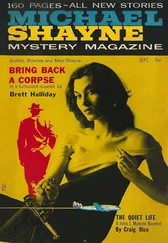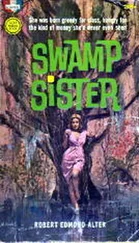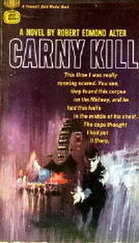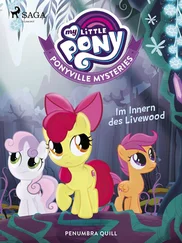“Please, not the head. Shoot me in the body. And there are no hidden microphones.”
The young man’s mouth worked as he tugged at his long hair. “You’re trying to sucker me into some kind of a trap. You want me to kill you, but I’m too smart for that. I’m not buying any murder rap.” He ran to the window and threw one leg over the sill. “You’ll have to die a natural death on your own, dad.” The man slid outside and disappeared.
Brett Delane had finished the second of his two telephone calls when the front door opened and his wife entered. Brett kissed her on the cheek. “Frightfully sorry I had to leave the dinner so abruptly, dear. I should have known that blasted curry would tie my stomach into knots, and I had left my ulcer medicine in the desk drawer.”
Brett helped his wife with her coat. “We had a prowler,” he said. “It was quite a dramatic scene, and I gave a magnificent performance. You’ll hear all about it when the reporters get here. Now be a good girl and hold them while I shower and put on my maroon dressing gown.”
Hunting Ground
by A. F. Oreshnik
It had rained earlier in the day. Dark gray clouds filled the sky and seemed to press ominously close to the ground. Gusts of chill northern wind chased dead leaves across the damp grass. Without exception, the wire frames that had been set up to hold floral wreaths at some grave sites had been blown over, spilling dying flowers and brightly colored satin and nylon ribbon onto the wet grass or muddy, raw earth.
Wilson Block stood with the collar of his dark topcoat turned up and the brim of his black hat turned down against the cold. The weather was terrible, but even on sunny days cemeteries were cheerless places. During his sixty-three years, Wilson Block had buried over forty wives, so he was an expert on cemeteries. Mount Calvary outside Buffalo, St. Louis’ Oak Grove, San Diego’s El Camino, and a few dozen others had received business as a result of his activities.
There had been a time when almost every grave had an elaborate headstone or piece of statuary sitting atop it. Now that was seldom permitted except in the older sections. One was allowed to mark a loved one’s location in the new areas, of course, but the stones usually had to be small and flush with the ground. Grass-cutting equipment could then be driven directly over the graves, thereby reducing maintenance costs to the minimum. It was all very unfeeling, and Wilson Block was repelled by it. Although he was a multiple murderer, he was not insensitive.
He held a silver-mounted, ebony walking stick in one gloved hand. He had owned it for over thirty years. There was a time when he had strolled jauntily along the boardwalk at Atlantic City, spinning the stick like a baton. When he had gone to New York City to visit his broker he had liked to stride purposely through the financial district, gripping the head tightly and reaching out to tap the sidewalk every fifteen or twenty feet. Now, however, the stick had become less of an ornament and more of a necessity. He would never walk anywhere unless he had the stick to lean upon and furnish support.
The woman was standing beside a fresh mound in the next section. She was about forty, five-foot-two and weighing a rounded and matronly 130 pounds. Her long, dark hair had a streak of gray. Because of the ban against large markers, Wilson Block had a clear view of the woman despite the fifty yards that separated them.
This was her fourth visit to the grave site in a week. She always came alone and never seemed to know what to do with herself. Sometimes she’d stand, shifting her weight from one foot to the other; sometimes she knelt and pulled out the weeds that were taking root.
After seeing her for the second time, Block had waited until she left, then approached the grave. There was no marker yet, but he was sure she had lost a husband. The woman’s nervous activity was the tip-off. He had noticed that women stand quietly beside children’s and friends’ graves, but seem driven to movement by a dead spouse. Perhaps it was because they were merely spectators of the lives of children and friends, while the loss of a husband left a giant void in their lives that had to be filled.
Block had no way of knowing how accurate his theory was, but its application had made him extremely wealthy. It was a tool that worked for him and that was the only test that mattered.
When he had committed his first murders forty-odd years before, he had found his victims through lonely-hearts advertisements in newspapers and magazines. Soon, however, this became both time-consuming and dangerous. Many amateur fortune hunters and inept murders began to compete with him for the more promising victims. This was hardly satisfactory, so he was forced to look for something different.
He found his next method of selection by chance. He had moved to a new city — immediately after a funeral — and had wanted to establish himself as a young widower as quickly as he could. There was a church a few blocks from the home he had rented, so he began attending services. Within a month he had been introduced to half a dozen widows and twice that many spinsters. All he had to do was choose.
Churches made an excellent hunting ground; nevertheless, they still fell short of being perfect. For one thing, the women he met were seldom wealthy or even comfortably well-off. The spinsters were invariably almost destitute; and the widows, even those who had collected modest insurance claims, as often as not had spent the money before Block got to them.
Despite the weakness of churches. Block might have continued to use them if it hadn’t been for the invention of the computer. Before computers, it had been a simple matter to give himself a new name and insure his wives, carefully selecting a different insurance company each time; but as soon as electronic data-processing became widespread, the companies began to pool their claims information and investigate beneficiaries more carefully. It was no longer possible to change his identity every time he moved, and it was no longer safe to collect the insurance of his wives. If he did either, the new electronic marvel would quickly single him out for human attention.
He could no longer marry a woman for her own insurance money, so he had to do it for her former husband’s. What better place to find a fresh widow than a cemetery? He figured, and that’s where he began to stalk them. If a woman had an insurance policy of her own, and most of them did, he always had her sign it over to a charity or close relative, thereby alleviating the possibility of suspicion later. He took whatever real estate, stocks, or cash there might be and considered the loss of the woman’s insurance money as a necessary operating expense.
The woman at the grave in the other section straightened her shoulders and seemed to take a firmer grip on her handbag. Wilson Block had wondered how long she was going to stand there. He was chilled to the bone. He turned and started down the walk toward her at the same moment she left the grave and began to walk in his direction. He timed it so that they reached the intersection at the same time and turned toward the entrance together.
The woman seemed a bit startled to find him walking beside her. She glanced up at his face and then quickly away.
“You do not have to be frightened,” Block said. He had a very deep and mellow voice that women had always found comforting. “I have been visiting my wife.”
The woman nodded without saying anything, but she made no effort to increase her pace. Then, as they reached the entrance, she blurted, “My husband is buried here,” and hurried away.
Wilson Block watched her go. As first contacts went, that had been about average. What was unusual, however, was the fact that he had found her very attractive. No woman had stirred him quite so much since he was in his twenties. Another positive factor had been the woman’s clothing. Her coat, shoes, and handbag had been new and very expensive, but they hadn’t been so new that they could have been purchased with sudden, recent insurance wealth. She had been used to comfortable living even before her husband died.
Читать дальше












